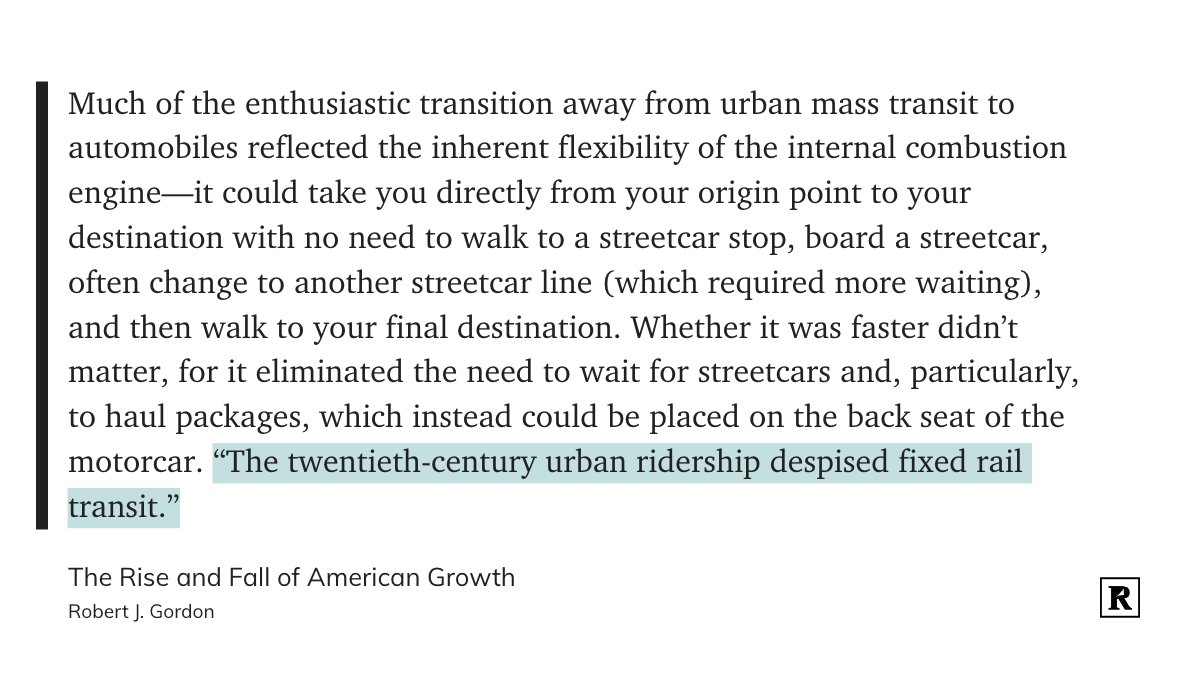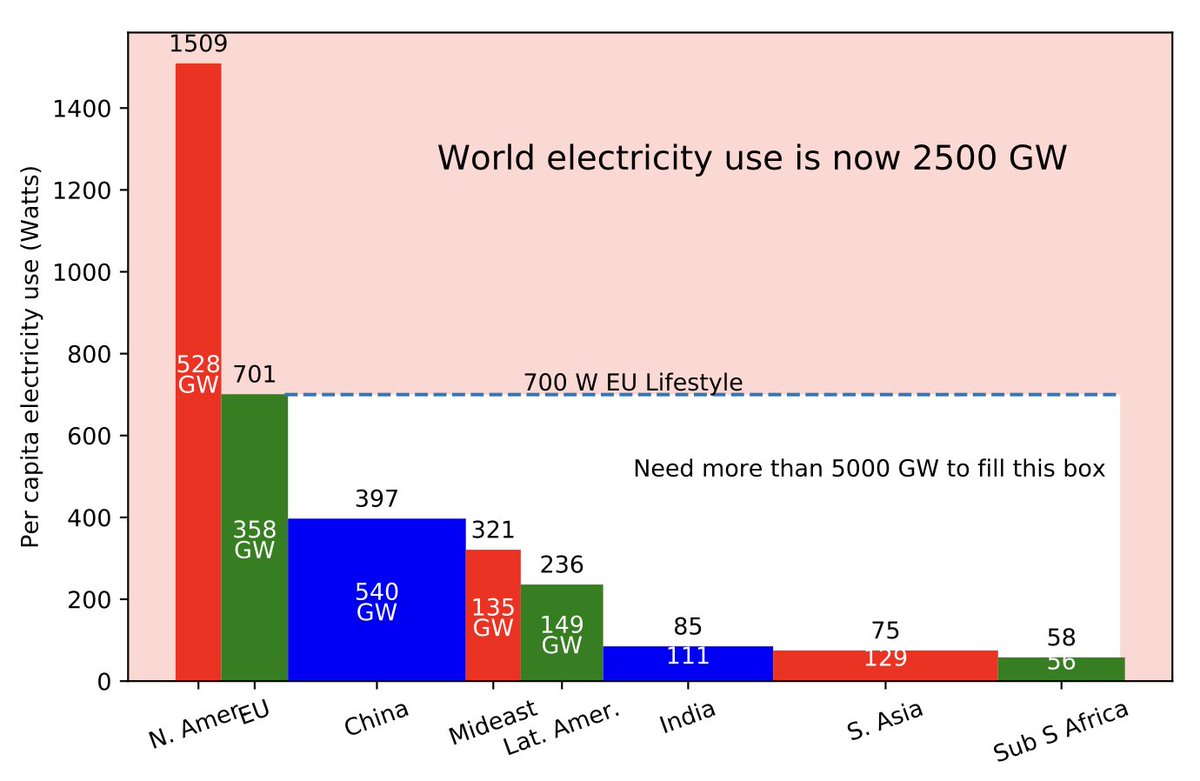
Cars are one of the most amazing and wonderful inventions in all of history. They serve us. They connect us. They liberate us.
The future should have lots more cars. Self-driving cars. Flying cars. Space cars! Cars are fantastic.
The future should have lots more cars. Self-driving cars. Flying cars. Space cars! Cars are fantastic.
https://twitter.com/jasoncrawford/status/1410286988096327680
Nothing else:
* Takes you directly from origin to destination
* Is available instantly on-demand
* Can carry a family and/or packages
* Protects you from the elements
* Is safe to use at night and in all weather
For convenience, practicality, and safety, cars are unbeatable.
* Takes you directly from origin to destination
* Is available instantly on-demand
* Can carry a family and/or packages
* Protects you from the elements
* Is safe to use at night and in all weather
For convenience, practicality, and safety, cars are unbeatable.
Cities should absolutely be designed around cars! Not as an exclusive consideration, but as one of the top considerations.
A city that is unfriendly to cars is a bad city.
A city that is unfriendly to cars is a bad city.
Cars were the savior of rural families, ending their isolation. Some farm families ranked having a car above even having a bathroom: 

The transition from urban transit to automobiles was “enthusiastic”. “The twentieth-century urban ridership despised fixed rail transit.” 

I am *not* saying that today's cities are designed optimally, or even well! There are probably much better ways we can accommodate many different ways of using and getting around a city. Walking, biking, transit are all great, and we should support those things better too.
I'm just pushing back against the deep, virulent anti-car sentiment I hear so often. People love to hate cars. They are unfairly maligned.
I repeat, cars are fantastic and one of the greatest inventions ever.
I repeat, cars are fantastic and one of the greatest inventions ever.
Nor am I saying we should design cities “for cars” or “around cars”. Cars aren't the only thing to optimize for, doing so would be unbalanced.
But designing “for cars” vs. “for people” is a false dichotomy. People use, enjoy, and benefit from cars!
But designing “for cars” vs. “for people” is a false dichotomy. People use, enjoy, and benefit from cars!
Incidentally, the value of transportation is super-linear: doubling the range you can travel (within a convenient period of time) quadruples the area and thus the opportunities that you can reach. 

Thank you to the small minority of people in this thread who are arguing with me in good faith!
Here are some replies worth reading with good counterpoints:
From @jmyld (thread)
https://twitter.com/jmyld/status/1410312806256181249
A few followup thoughts, then I'm signing off for a bit.
The main thing I've learned from the replies is that 90+% of the car hate is about cars *in cities*—how roads are designed, traffic, congestion, smog, parking space, pedestrian/bike accidents, etc.
And maybe that is fair!
The main thing I've learned from the replies is that 90+% of the car hate is about cars *in cities*—how roads are designed, traffic, congestion, smog, parking space, pedestrian/bike accidents, etc.
And maybe that is fair!
I can believe that we made a terrible mistake somewhere in how we set up our cities and built roads through them. Maybe there is a much better way to arrange things.
And maybe that looks like: more car-free zones, more room for pedestrians and bikes, more transit, etc.
And maybe that looks like: more car-free zones, more room for pedestrians and bikes, more transit, etc.
So, let me clarify and correct this tweet.
1. Cities should be designed taking into account the immense value of cars, but not “designed for cars” or “around cars”, if that is taken to mean excluding other things we want to optimize for…
1. Cities should be designed taking into account the immense value of cars, but not “designed for cars” or “around cars”, if that is taken to mean excluding other things we want to optimize for…
https://twitter.com/jasoncrawford/status/1410291281926885378
2. The second paragraph in that tweet is wrong. There are good cities that are not car-friendly.
But all else being equal, accommodating cars—being drivable—is a good thing.
But all else being equal, accommodating cars—being drivable—is a good thing.
Of course, all else is never equal! This the most compelling counterargument: that there are inevitable tradeoffs between drivability, walkability, and other aspects of livability. They're hard tradeoffs.
But if our cities are badly designed in how they accommodate cars—*that is the fault of the cities* (and their planners), *not the cars*.
Blaming cars *as such* is throwing out the baby with the bathwater. And I intend to rescue the baby.
Blaming cars *as such* is throwing out the baby with the bathwater. And I intend to rescue the baby.
That's what this thread was actually about—a defense of the car as such (not a defense of any particular city design).
This is why I included the quotes about cars and rural life—to remind people of the benefits of cars as such, and that not everything is about cities.
This is why I included the quotes about cars and rural life—to remind people of the benefits of cars as such, and that not everything is about cities.
But—this has inspired me to learn more about the city planning issue, and to actually form an opinion on whether and where we went wrong, and what would be a better way forward.
Thanks for people who linked to some reading there.
Thanks for people who linked to some reading there.
Some people objected in general that cars are dangerous. In a sense, this is very true—road injuries are the top non-disease cause of death. And every one is a tragedy:
ourworldindata.org/grapher/annual…
ourworldindata.org/grapher/annual…
But this is as much a function of *how much we drive* as of auto safety itself. In the US, auto-related deaths (including pedestrians and cyclists) have declined to about 1 per *100 million* vehicle miles. commons.wikimedia.org/wiki/File:USA_… 

Another objection is climate change. That's a whole other thread that I don't have time for now, but in brief: all transportation, like all of life, uses energy. We don't need less energy usage—we need safe, clean, cheap, abundant energy.
I started this thread because I posted this quote and got some snarky replies that were unfair to cars.
So, to come back to the beginning, I repeat: cars are one of the greatest inventions ever. 🚗
So, to come back to the beginning, I repeat: cars are one of the greatest inventions ever. 🚗
https://twitter.com/jasoncrawford/status/1410286988096327680
• • •
Missing some Tweet in this thread? You can try to
force a refresh








